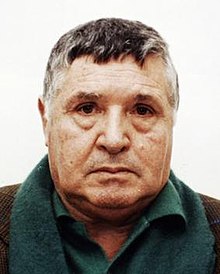Salvatore Riina
| Salvatore Riina | |
|---|---|

Mugshot of Mafia boss Totò Riina after his arrest in 1993
|
|
| Born |
Salvatore Riina 16 November 1930 Corleone, Sicily, Italy |
| Nationality | Italian |
| Other names |
"Totò 'u curtu" (Totò the Short) "La belva" (The Beast) "Il capo dei capi" (The Boss of the Bosses) |
| Occupation | Mafia Boss |
| Criminal charge |
Mafia association Multiple murder |
| Criminal penalty |
Life imprisonment (multiple life sentences related to different homicides and mass murders) |
| Criminal status | Imprisoned since 1993 |
| Spouse(s) | Antonia "Ninetta" Bagarella |
| Children | Giovanni, Giuseppe |
| Allegiance | Corleonesi |
| Conviction(s) | Mafia association, multiple murder |
Salvatore "Salvo" Riina /ˈriːnə/ (born 16 November 1930), called Totò 'u Curtu (Sicilian: '"Totò the Short"'; Totò is another nickname for "Salvatore"), is the former chief of the Sicilian Mafia, known for a ruthless murder campaign that reached a peak in the early '90s, when the deaths of Antimafia Commission prosecutors Giovanni Falcone and Paolo Borsellino caused widespread public revulsion and led to a major crackdown by the authorities. He was also known by the nicknames la belva ("the beast") and il capo dei capi (Sicilian: 'u capu di 'i capi, "the boss of the bosses").
Riina succeeded Luciano Leggio as foremost boss of the Corleonesi faction of the criminal organization in the early 1980s and achieved dominance by a campaign of violence, which caused police to target his rivals. As a fugitive Riina was less vulnerable to the law enforcement reaction to his methods, and police removed many of the older type of boss, who had operated by influence peddling and bribery. Favoured assassin Giovanni Brusca estimated he murdered 100-200 people on Riina's orders. Riina also advocated, in violation of traditional Mafia codes, the killing of women and children, and killed uninvolved members of the public solely to distract law enforcement. Although his scorched-earth policy neutralized any internal threat to his position, Riina increasingly showed a lack of his earlier guile by bringing his organization into open confrontation with national authorities. After decades living as a fugitive he was captured, which provoked a series of indiscriminate bombings of art galleries and churches. Riina is currently being held on the stringent Article 41-bis prison regime, one of several measures that resulted from his defiant strategy.
...
Wikipedia
